How do you handle high-stress situations in a surgical setting?
JUNIOR LEVEL

Sample answer to the question:
In high-stress situations in a surgical setting, I remain calm and focused by relying on my training and experience. I prioritize tasks and communicate effectively with the team to ensure smooth coordination. I am accustomed to making quick decisions under pressure and taking immediate action when necessary. In the past, I have encountered emergency situations where I had to perform life-saving surgeries with limited resources. In those instances, I remained composed, utilized my problem-solving skills, and prioritized patient safety. I also practice self-care outside of work to maintain a healthy mindset and cope with stress effectively.
Here is a more solid answer:
Handling high-stress situations in a surgical setting is something I am accustomed to due to my training and experience. I rely on my strong decision-making and problem-solving skills to effectively navigate through these situations. In a recent emergency surgery, a patient was brought in with severe trauma, requiring immediate intervention. I quickly assessed the situation, delegated tasks to the team, and communicated the plan effectively. Despite the intensity of the situation, I remained calm and focused, ensuring the patient's stability throughout the procedure. I also prioritize self-care and engage in activities like yoga and mindfulness to maintain a healthy mindset when faced with stress.
Why is this a more solid answer?
The solid answer expands on the candidate's ability to handle high-stress situations by providing a specific example of a recent emergency surgery where they demonstrated their decision-making and problem-solving skills. It also mentions their ability to delegate tasks, communicate effectively, and prioritize patient safety. Furthermore, it highlights their practice of self-care as a means to cope with stress. However, it could benefit from further elaboration on their experience in working effectively under high-stress conditions.
An example of a exceptional answer:
Handling high-stress situations in a surgical setting is where my expertise truly shines. I possess the ability to remain composed and make critical decisions swiftly. For instance, during a chaotic trauma scenario, a patient came in with multiple life-threatening injuries. In collaboration with the trauma team, I prioritized interventions based on the severity of the injuries, effectively coordinating the efforts of multiple healthcare professionals. This resulted in successful stabilization of the patient and subsequent life-saving procedures. To enhance my ability to work under high-stress conditions, I actively seek out opportunities for simulation training and participate in regular debriefings to reflect on my performance and identify areas for improvement. Additionally, I support team members by fostering a positive work environment and providing emotional support during highly stressful situations.
Why is this an exceptional answer?
The exceptional answer builds upon the solid answer by showcasing the candidate's expertise in handling high-stress situations. It provides a detailed example of a trauma scenario and highlights their ability to effectively coordinate the efforts of multiple healthcare professionals. Additionally, it mentions their commitment to continual learning and improvement by engaging in simulation training and debriefings. The answer also demonstrates their leadership skills by supporting team members and fostering a positive work environment. Overall, it presents a comprehensive and impressive response to the question.
How to prepare for this question:
- Familiarize yourself with emergency surgical protocols and best practices to showcase your knowledge and preparedness.
- Reflect on past experiences where you successfully managed high-stress situations in a surgical setting and prepare specific examples to share during the interview.
- Demonstrate your ability to prioritize tasks and communicate effectively with a multidisciplinary team, emphasizing the importance of collaboration in high-stress environments.
- Highlight any additional training or certifications you have obtained that are relevant to handling high-stress situations in a surgical setting, such as advanced life support certifications.
- Discuss your approach to self-care and stress management outside of work, emphasizing the importance of maintaining a healthy mindset.
What are interviewers evaluating with this question?
- Decision-making and problem-solving
- Ability to work effectively under high-stress conditions
- Communication skills

